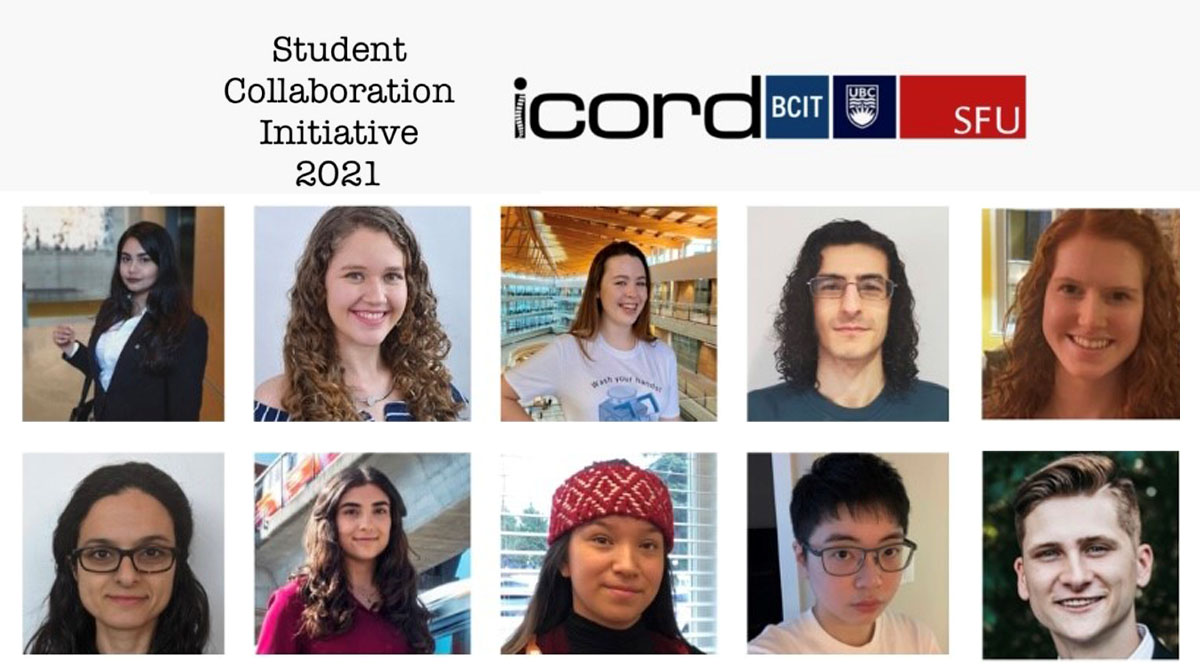For the past two years, there has been a significant shift in the way students and researchers manage their research. Many students used only video conferencing to conduct their research or complete their co-op work terms as the physical collaboration was not possible due to safety guidelines during the COVID-19 pandemic.
Last summer, members of BCIT MAKE+ and other researchers came up with the idea to create a Student Collaborative Initiative (SCI) to help connect summer co-op students and researchers from BCIT, SFU, UBC, and ICORD. BCIT Mechanical Engineering co-op student Lael Kliewer and SFU Mechatronic Systems Engineering co-op student Amadea de Wit took on the task of taking the Student Collaboration Initiative from concept to reality.
“It was great seeing the students run with the idea. Not only did this allow them to customize the collaboration in ways that made sense for the group, the students also gained valuable leadership experience running this program,” said Johanne Mattie, BCIT MAKE+ Project Lead.
The goal of the SCI was to re-establish a sense of community and connection among summer co-op students during the pandemic, while also providing them with networking opportunities, seminars, workshops, and weekly project update meetings related to their spinal cord injury-related research projects.
“Without SCI, many of our students would have been working in isolation for their summer co-ops which can be tough. The SCI gave them a chance to connect with other like-minded students, providing both comradery and great learning experiences,” said Johanne Mattie, BCIT MAKE+ Project Lead. “We saw lots of benefits of the SCI for both students and supervisors, and we look forward to welcoming another SCI cohort this summer”.
An elevated learning and research experience
This new form of remote learning has proved to be a lifesaver for students – resulting in sharing of information among other students and researchers using discussion panels, workshops, and in-person visits. These interactions are essential for student researchers and can potentially lead to new research opportunities and help facilitate and connect post-secondary institutions.
Sixteen post-secondary students and their research supervisors successfully participated in the SCI program last summer. For 16 weeks, participating students interacted and collaborated, and felt that this approach not only exceeded their expectations but also helped elevate their learning experience. Learning about other students’ and supervisors’ projects gave insights into areas they might have not yet been exposed to otherwise, and that the things they learned from the SCI events helped to provide context for their own summer research projects and even broadened their horizons for future career options.
Students had the opportunity to attend workshops on industrial design, product quality systems, physiology, modelling and simulation, and additive manufacturing from supervisors within the SCI. Students were also hosted for tours of BCIT’s Rehabilitation Engineering Design Lab (REDlab) and ICORD’s Physical Activity Research Center (PARC) where they got to learn about the projects that fellow students in the initiative were working on. A highlight from these tours was learning about the history of wheelchairs at ICORD and getting hands-on experience with trying to navigate wheelchairs from various time periods.

“During my co-op work term this summer, I helped to develop the adapted rowing exercise machine (aROW), for wheelchair users with spinal cord injury. I also assisted with a physiology study for the Rehabilitation Engineering Design Lab (REDLab) elliptical-style exercise machine (AAPLEwalk) and co-lead the Student Collaboration Initiative. It was a busy but rewarding summer and a great first co-op experience.” said Amadea de Wit, SFU Research and Development Engineer Intern. “The SCI was such a neat thing to be a part of, we had students from all over the lower mainland, as well as one student from Costa Rica, yet we were all able to all collaborate and created a wonderful sense of community. I always looked forward to connecting with my peers during the weekly SCI events and meetings and learned so much from the presentations and site visits we got to attend. Since finishing my work term, friends that I made from the SCI have called our group of summer co-op students the “SCI family” and I think that just speaks volumes about how we were able to transform the isolation of remote work during covid-19 into an experience of collaboration and connection for co-op students.”

“SCI initiative created more opportunities to expand my understanding and perspective, and make me more equipped to approach my project.” said Lael Kliewer, BCIT’s Bachelor’s of Engineering in Mechanical Engineering student “ Whether this came from workshops taught by experienced supervisors, project update meetings with other co-op students, or simply by talking with people with spinal cord injuries, the SCI initiative created more opportunities to expand my understanding and perspective, and make me more equipped to approach my project.”
Student researchers: Amadea de Wit (SFU), Lael Kliewer (BCIT), Sabiha Sultana (UBC), Hilda Vásquez Carvajal (BCIT), Elliott McWilliams (SFU), Andrew Hanna (BCIT), Mahsa Khalili (UBC), Mona Behrouzian (UBC), Shana George (UBC), and Terry Hsu (BCIT).
Researchers: Carolyn Sparrey (ICORD/SFU), Bonita Sawatzky (ICORD/UBC), Jaimie Borisoff (ICORD/ BCIT), and Johanne Mattie (BCIT).
About MAKE+
MAKE+ is a group of multidisciplinary research staff focused on product and process development, evaluation, applied research projects, and education. The MAKE+ sub-group PART (Product and Process Applied Research Team), is the only academic product development group in Canada registered to IS0 13485 (Medical Devices) Quality Management Systems.
At MAKE+ we can take your ideas to the next level. We are highly skilled in the areas of evaluation, ergonomic assessments, health, consumer, and industrial technology development, automation and electronics.

thanks for information